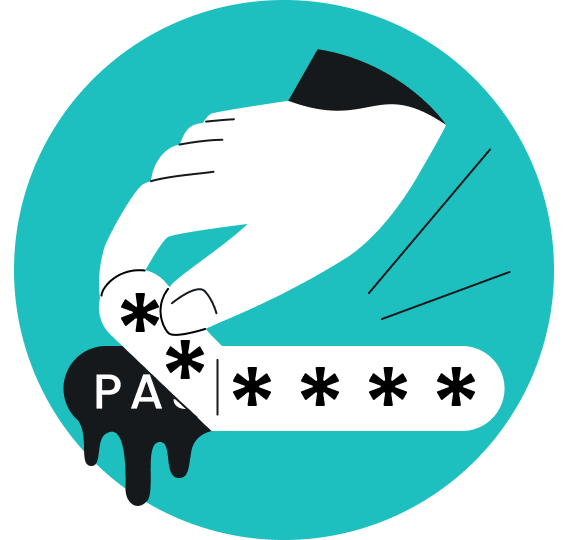While DeepSeek is a capable and fast-growing AI tool, it comes with serious privacy concerns. This is mainly because it stores user data on servers in China, a state with legal means to access corporate data.
Still, DeepSeek has been gaining traction quickly. It’s fast, user-friendly, and free to try. In this article, we’ll break down what DeepSeek is, what types of data it collects, and why cybersecurity experts are raising alarms. We’ll also cover how to minimize the risks if you decide to use it anyway.
What is DeepSeek, and how does it work?
DeepSeek is a general-purpose AI model designed for tasks like writing code, summarizing text, translating languages, and generating content. It competes with tools like ChatGPT and Claude AI.
It uses a Mixture-of-Experts (MoE) architecture, activating only the parts of the model needed for each task, making it faster and more efficient. It also features Multi-head Latent Attention (MLA), which helps it focus on the most relevant parts of your input.
DeepSeek is fast, flexible, and available both as a web-based assistant and an open-source, locally-run model.
DeepSeek Chat vs. DeepSeek-R1: a difference in privacy
If you’re wondering whether DeepSeek is safe to use, the first thing you need to know is this: there are two “versions” of DeepSeek, and your privacy heavily depends on which one you’re using:
| DeepSeek Chat (online) | DeepSeek-R1 (offline) | |
|---|---|---|
| Model | deepseek-chat (DeepSeek-V3) | deepseek-reasoner |
| Internet connection | Required | Not needed (after setup) |
| Prompt processing location | DeepSeek’s servers | Local, on your own hardware |
| Security risks | Data processed and stored on servers subject to Chinese law | Limited to your local environment |
| Ease of use | Available through the web or mobile app | Requires setup and some technical know-how |
| Best for | Casual use, quick access, trying the model out | Privacy-conscious users, sensitive work, developers |
| Device requirements | Works in browser or app | Needs local resources |
| Update frequency | Always up-to-date with the latest model | Static unless manually updated |
Note: this comparison was made on April 4, 2025
DeepSeek Chat: cloud-based and riskier
DeepSeek Chat is the online version of the model. When you use it in a browser or through the mobile app, your prompts are sent to DeepSeek’s servers — which are located in China. That means your data may be stored and processed under Chinese law, which allows the government to access corporate data. From a privacy standpoint, that’s a real concern.
DeepSeek-R1: local and more private
DeepSeek-R1 is the offline version. It runs locally on your device with no external servers involved, so your data stays on your machine. This makes it the safer choice if you’re handling sensitive content or just value your privacy.
What makes DeepSeek stand out from other AI models?
There’s no shortage of AI models out there — ChatGPT, Claude, Gemini, LLaMA, Mistral, and recently Manus — the list keeps growing. So what makes DeepSeek stand out?
It’s open-source (sort of)
Unlike ChatGPT and Claude, which are closed systems owned by big tech companies, DeepSeek offers an open-source version of its model. That means developers can download it, run it locally, and even fine-tune it for their own projects. This makes it more accessible for folks who don’t want to rely on cloud-based tools or prefer having more control over the AI they’re using.
It’s built for efficiency
Thanks to its Mixture-of-Experts setup, DeepSeek doesn’t waste resources. It only activates the parts of the model it needs for a specific task, making it faster and cheaper to run. This gives it an edge in situations where computing power is limited — like running AI on your own device instead of a data center.
It handles code and math really well
DeepSeek has been praised for its ability to generate clean code and solve complex math problems. While it’s not alone in this space — ChatGPT and Gemini are also solid at coding — some developers have pointed out that DeepSeek performs surprisingly well for an open-access model, especially considering its relatively recent release.
Using its online version could be risky
This is what raises both interest and concern — and the reason behind this article. DeepSeek is developed by a Chinese AI company, which means it’s built under a different set of rules and regulations than models coming out of the US or Europe. That has implications for how DeepSeek Chat handles your data — more on that in the next section.
What data can DeepSeek Chat collect?
When you use an online AI model like DeepSeek Chat, it’s never just a one-way street. After all, you’re feeding it data — your prompts, your questions, and sometimes sensitive information. Depending on how the system is set up and what laws are at play, all that information might not stay private.
Note: The following information is based on the March 24, 2025, publication by the Center for Internet Security (CIS) Countering Hybrid Threats (CHT) team.
1. Input data (your prompts)
Like most AI models, DeepSeek processes the text you type in. That could include questions, personal details, work content, or anything else you share. If you’re using the online version (DeepSeek Chat), there’s a good chance this input data is logged or stored temporarily to improve the model’s performance or train future versions.
2. Device and usage info
Reports suggest that DeepSeek’s iOS app disables ATS (App Transport Security). Without ATS, apps can send data over unencrypted connections, which could expose device information, IP address, location data, or even what you’re doing inside the app.
3. Network telemetry
DeepSeek may collect metadata about your connection, including session duration, frequency of use, and network performance metrics. This information helps them optimize their service but also creates a digital footprint of your usage patterns.
4. Third-party sharing
There’s limited transparency about how DeepSeek shares data with partners, advertisers, or other third parties. Without clear policies, your conversations might be analyzed for commercial purposes beyond just improving the AI.
5. Your personality type and more
AI models excel at analyzing and finding patterns in large volumes of data — it’s what they’re built for. But because there’s so little transparency around how DeepSeek handles user data, your interaction history could be used to build a detailed profile of your interests, work projects, or personal inquiries. It’s impossible to say definitively what DeepSeek collects — and that’s the concerning part.
Is DeepSeek safe to use? What’s concerning about it?
When it comes to AI, convenience can come at the cost of privacy — and DeepSeek is no exception. While it’s powerful and fast, there are some things you should be at least aware of before you start using DeepSeek AI.
Your data is stored in China — and that may not be a good thing
DeepSeek’s servers are based in China, which means that any data you share with it online is governed by Chinese laws. This is far from a technical detail — local national security laws let the government access DeepSeek’s data on demand and with little transparency. So if you’re using DeepSeek outside China, be aware that the data protection standards you’re used to no longer apply. Your private information could be shared without your knowledge or consent.
Weak app-level security
Security researchers have flagged DeepSeek’s iOS app for disabling Apple’s built-in App Transport Security (ATS). That’s a big deal — ATS is supposed to make sure your data is sent over encrypted, secure connections. Without it, your data might be exposed to third parties while it’s being transmitted. Think man-in-the-middle attacks or accidental leaks on public Wi-Fi.
No clear user protections
While DeepSeek does provide a Privacy Policy and Terms of Use, these documents offer only general information about data collection and usage practices and do not comprehensively address data retention periods, encryption methods, or compliance with international data protection regulations like the GDPR or CCPA. There’s no clear outline of whether DeepSeek AI encrypts your inputs, whether it deletes logs, or what steps (if any) it takes to protect users’ identities. That kind of lack of transparency raises multiple red flags.
Official and corporate bans
These aren’t just theoretical concerns. The US Navy has banned its personnel from using DeepSeek, citing national security risks. Major companies — including Vodafone and the Commonwealth Bank in Australia — have also blocked access to DeepSeek due to similar fears. That says a lot about how it’s perceived in the cybersecurity space.
How to use DeepSeek more safely
Look, we get it — DeepSeek is fast, flexible, and kind of impressive. But if you’re going to use it, especially for work or anything sensitive, you need to be really smart about it. Here are a few ways to lower your risk:
1. Use a VPN
If you’re using DeepSeek Chat (the online version), a VPN is a smart move. It encrypts your internet traffic and hides your IP address, which makes it harder for DeepSeek or any third party to track your location or build a profile on you. This won’t stop DeepSeek from seeing what you type, but it does make it harder to tie that data directly to you.
2. Leave the personal stuff out
Avoid typing in anything you wouldn’t want a stranger — or a government — to see. That includes passwords, financial info, client data, internal company content, or anything that could be traced back to you or compromise somebody’s interest or safety. Assume everything you type is being logged.
3. Stick to the offline version if you can
If you’re tech-savvy, consider using the open-source version of DeepSeek on your own machine. That way, you avoid sending any data to external servers. It’s more private, more secure, and you stay in full control.
4. Skip the app
If you’re stuck with DeepSeek Chat, your safest bet is to use it in a web browser. The mobile app, especially on iOS, has been flagged for disabling App Transport Security — which weakens encryption and could expose your data in transit. Unless DeepSeek rolls out a major security fix, the app just isn’t worth the risk.
5. Monitor privacy policy changes
If DeepSeek updates its privacy documentation or terms of service, take a minute to actually read it (we know — but seriously). Watch for changes in how they collect, store, or share your data.
Conclusion — it’s how (and where) you use it
The concerns around DeepSeek’s privacy and security practices are far from minor. The company’s approach to collecting, storing, and processing user data is unclear, and the fact that major governments and businesses have already banned its use should give you serious pause.
Here’s the bottom line: if you’re curious about DeepSeek’s capabilities and want to test the waters with casual use, go for it — but don’t share anything personal, and consider using a VPN. For sensitive information, either choose a more privacy-focused AI or run DeepSeek’s open-source model locally to maintain more control.
FAQ
Does DeepSeek AI collect your data?
Yes — if you use DeepSeek’s online platform or mobile app, your inputs and usage data may be collected. That data is reportedly stored on servers in China, where privacy laws differ significantly from those in the US or EU.
Can I get in trouble for using DeepSeek AI?
While using DeepSeek isn’t illegal for individuals, some major companies and organizations — including banks, tech firms, and even the US Navy — have banned it due to security concerns.
What data does DeepSeek AI collect from users?
DeepSeek may collect your text inputs, device information, IP address, and possibly location data. On mobile, security researchers have flagged potential vulnerabilities that could expose even more metadata.
Is DeepSeek AI safe to use in the USA?
There’s no law preventing US users from accessing DeepSeek, but using it could pose data privacy risks. Because your data may be stored in a foreign jurisdiction, sensitive information should not be shared through the platform.
For a broader look at how AI tools impact security, see how generative AI in cybersecurity is being used to defend — and attack — digital systems.
Is DeepSeek AI free?
Yes, DeepSeek currently offers free access to both its online chatbot and the downloadable open-source model. However, free doesn’t mean risk-free — especially when it comes to your data.
Is DeepSeek AI safe to install locally?
Running DeepSeek locally is generally safer, as it keeps your data on your device instead of sending it to external servers.
How can I delete my data from DeepSeek AI?
At the time of writing, DeepSeek does not provide a public process for users to request data deletion. If data control is a priority for you, this is something to consider before using the platform.
Which AI tools are compatible with Surfshark VPN?
You can use Surfshark VPN with virtually any AI tool that runs through your web browser or mobile app, such ChatGPT, Sora 2, or DeepSeek. Using a VPN helps protect your privacy and secure your internet traffic when working with AI tools, especially on public or shared networks.
Will AI take over the world?
Not in the foreseeable future — current AI lacks genuine understanding and autonomy, and experts are divided on whether that’s even achievable. The real concern isn’t machines seizing control, but humans gradually outsourcing too many decisions to algorithms without proper oversight.


